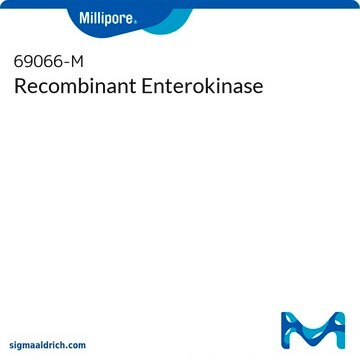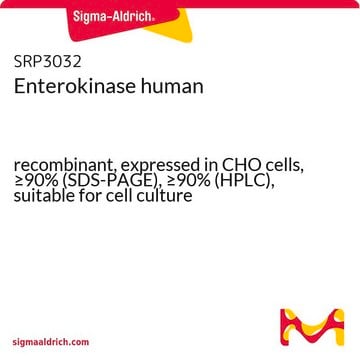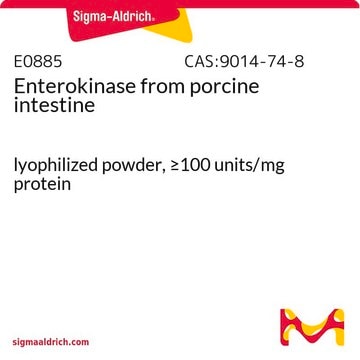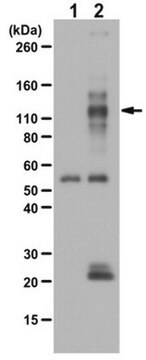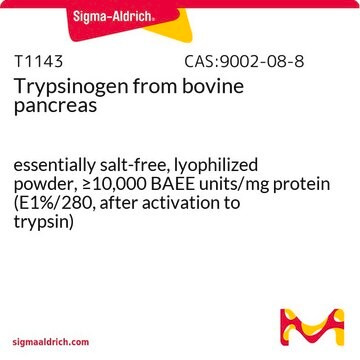推薦產品
重組細胞
expressed in E. coli
產品線
BioUltra
化驗
≥95% (SDS-PAGE)
形狀
solution
比活性
≥20 units/mg protein
分子量
150 kDa
包裝
vial of ~0.2 unit
濃度
≥0.1 mg/mL
運輸包裝
wet ice
儲存溫度
−20°C
尋找類似的產品? 前往 產品比較指南
應用
来自牛肠的肠激酶已被用于研究中评估十二指肠酶,其作为级联消化蛋白酶的潜在激活剂。来自牛肠的肠激酶也已用于研究来自牛十二指肠的肠肽酶和胰蛋白酶的抑制剂。
融合蛋白切割的典型条件:
使用 500 mM Tris-HCl,pH 8.0,2.0 mM CaCl2 和 1% Tween® 20 将融合蛋白浓度调节至 1.5 mg/ml,pH 值在 7.0-8.0 之间
以约 0.02 单位/0.02 mg 融合蛋白的比例将肠激酶添加到融合蛋白溶液中,并混合均匀
将反应混合物在约 25℃ 下孵育 16 小时
使用 500 mM Tris-HCl,pH 8.0,2.0 mM CaCl2 和 1% Tween® 20 将融合蛋白浓度调节至 1.5 mg/ml,pH 值在 7.0-8.0 之间
以约 0.02 单位/0.02 mg 融合蛋白的比例将肠激酶添加到融合蛋白溶液中,并混合均匀
将反应混合物在约 25℃ 下孵育 16 小时
该酶(来自 Sigma)已用于比较其与在大肠杆菌中过表达中纯化而来的重组牛肠激酶(轻链)的比活性。
肠激酶是 S1 肽酶家族的一员。在体内,它负责胰蛋白酶原胰蛋白酶的蛋白水解活化。肠激酶用于位点含有可进入肠激酶识别位点的重组融合蛋白进行位点特异性切割,以去除亲和标签。
生化/生理作用
肠激酶是膜结合的丝氨酸蛋白酶,其特异性地和快速地将胰蛋白酶原转化为胰蛋白酶,从而引发其他酶原转化为活性酶。它的分子量约为 150 kDa。该酶是异二聚体,其中轻链和重链通过两个二硫键连接。天然肠激酶由 800 个氨基酸的重链和 235 个氨基酸的轻链组成。它是含有 35% 碳水化合物的糖蛋白。胰蛋白酶原的多肽链仅在-(Asp)4--Lys-序列后的位置发生水解。该切割位点掺入到 FLAG 标签中。该 FLAG® 蛋白表达系统基于 8 氨基酸 FLAG 标签与目标重组蛋白的融合。肠激酶切割融合蛋白,并除去 FLAG 标签。大豆胰蛋白酶抑制剂可抑制该酶。肠激酶通常用于蛋白质修饰和氨基酸序列测定。
物理性質
28 kDa 轻链形式
單位定義
在 pH 5.6,25°C 条件下,一个单元每分钟将从胰蛋白酶原产生 1.0 纳摩尔的胰蛋白酶。
外觀
以溶于 20mM Tris-HCl,200mM NaCl 和 50% 甘油的溶液形式提供
法律資訊
FLAG is a registered trademark of Merck KGaA, Darmstadt, Germany
TWEEN is a registered trademark of Croda International PLC
儲存類別代碼
10 - Combustible liquids
水污染物質分類(WGK)
WGK 1
閃點(°F)
Not applicable
閃點(°C)
Not applicable
個人防護裝備
Eyeshields, Gloves, multi-purpose combination respirator cartridge (US)
分析證明 (COA)
輸入產品批次/批號來搜索 分析證明 (COA)。在產品’s標籤上找到批次和批號,寫有 ‘Lot’或‘Batch’.。
客戶也查看了
T S Zamolodchikova et al.
Bioorganicheskaia khimiia, 24(4), 300-305 (1998-06-05)
The substrate specificity of duodenase from bovine duodenum mucosa to synthetic and natural polypeptides was studied. Amino acid residues preferential for duodenase in the P1 and P2 positions of the substrate were determined. It was shown that the enzyme is
A G Mikhaĭlova et al.
Voprosy meditsinskoi khimii, 44(4), 338-346 (1998-12-10)
Enteropeptidase inhibitor (DI) was isolated from bovine duodenum during purification of this enzyme. DI was purified by affinity chromatography on immobilised trypsin. DI preparations contain two main components: DI-9 (9 kD) and DI-20 (20 kD). The N-terminal amino acid sequence
X Zheng et al.
The Journal of biological chemistry, 274(3), 1596-1605 (1999-01-09)
Enteropeptidase is a heterodimeric type II membrane protein of the brush border of duodenal enterocytes. In this location, enteropeptidase cleaves and activates trypsinogen, thereby initiating the activation of other intestinal digestive enzymes. Recombinant bovine enteropeptidase was sorted directly to the
Haidong Tan et al.
Protein expression and purification, 56(1), 40-47 (2007-08-21)
The nucleotide sequence encoding bovine enterokinase light chain (EK) from Chinese northern yellow bovine was isolated. Two single-nucleotide mutations, namely, C245G and A528T were identified. The gene encoding the Pro82Arg/Glu176Asp variant of known bovine EK was fused with glutathione S-transferase
Yutetsu Kuruma et al.
Nature protocols, 10(9), 1328-1344 (2015-08-14)
Cell-free gene expression systems are biotechnological tools for the in vitro production of proteins of interest. The addition of membrane vesicles (liposomes) enables the production of membrane proteins, including those in large-molecular-weight complexes, such as the SecYEG translocon or ATP
我們的科學家團隊在所有研究領域都有豐富的經驗,包括生命科學、材料科學、化學合成、色譜、分析等.
聯絡技術服務
